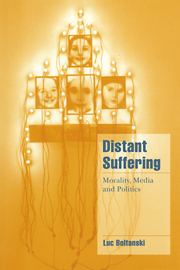9 - What reality has misfortune?
Published online by Cambridge University Press: 22 September 2009
Summary
The proposals of commitment
In relation to the media, the spectator occupies the position (described at the end of chapter 3) of someone to whom a proposal of commitment is made. A different spectator, who recounts a story to him, and who may be a reporter, that is to say an eye-witness, or who may have gathered information supposed to have come from an eye-witness (as in the case of press agency reports), conveys statements and images to a spectator who may take them up and, through his words, pass on in turn what he has taken from these statements and images and the emotions they aroused in him. These are not just any kind of statements and images. Informed by one or other of the topics whose broad features we have sketched out, and as such mixing a description of suffering and the expression of a particular way of being affected by it, they propose to the spectator a definite mode of linguistic and conative emotional commitment. The spectator can accept the proposal made to him, be indignant at the sight of children in tears being herded by armed soldiers; be moved by the efforts of this nurse whose hands are held out to someone who is starving; or feel the black beauty of despair at the execution of the absolute rebel proudly draped in his crime. He can also reject the proposal or return it.
- Type
- Chapter
- Information
- Distant SufferingMorality, Media and Politics, pp. 149 - 169Publisher: Cambridge University PressPrint publication year: 1999



